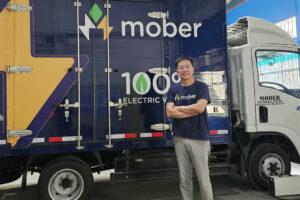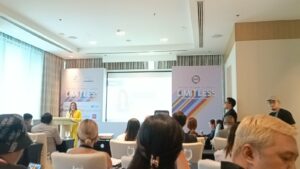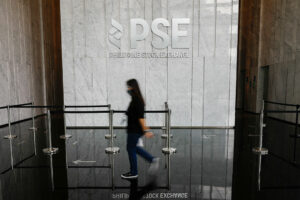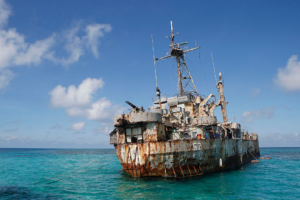By Revin Mikhael D. Ochave, Reporter
DENNIS O. NG, founder and chief executive officer of green logistics startup Mober Technology Pte., Inc., is pushing for the broader adoption of electric vehicles (EVs) in the last-mile delivery market, citing the logistics sector as a major contributor to carbon emissions.
“For us in the logistics, transportation, and delivery sectors, we need to reduce emissions since we are always on the road,” Mr. Ng said in an interview with BusinessWorld.
Last-mile delivery refers to the final leg of the delivery process. A report by Clean Mobility Collective and Stand.earth in July 2022 indicated that last-mile delivery contributes up to half of total delivery carbon emissions.
Mr. Ng is an accountant by profession, having graduated from Aquinas University of Legazpi City in Albay province, now known as the University of Santo Tomas-Legazpi.
He had a diverse background, including the salt business, showbiz magazine publishing, and other technology ventures, prior to establishing Mober.
“I’ve been a serial entrepreneur since childhood. It was challenging to ask for allowance back then,” he said.
Mober was founded in July 2015 with the purpose of assisting small- and medium-sized enterprises with their on-demand logistical needs.
“Our first delivery was in January 2016. When I started Mober, it was an app. Technically, Mober is the first delivery app in the country,” Mr. Ng said.
“However, the problem back then was raising funds. Being a Filipino startup during those times, the venture capitalists and investments were focused on Indonesia,” he added.
Mr. Ng said that Hong Kong-based logistics giants Lalamove and GoGoVan (now GoGoX) dominated the last-mile delivery market when Mober was starting.
“We looked for something different in their systems. We were able to develop a system that allows mall retailers to book deliveries. They can also see the available timeslots. We designed that system to make sure that a driver will accept the delivery,” he said.
“Unlike the on-demand nature of other companies in which people will book and the nearest available driver will accept the delivery. That is something that we have changed, differentiating us from other platforms,” he added.
Recognizing the need to address carbon emissions, Mr. Ng transitioned Mober to an EV fleet in 2021.
Currently, Mober is enabling sustainable delivery for prominent retail giants in the Philippines, including IKEA Philippines, SM Appliance Center, Unilever Philippines, Nestlé Philippines, Nespresso, and Monde Nissin, as well as logistics firms Maersk and Kuehne+Nagel.
With a fleet exceeding 60 electric vehicles and a charging hub in Pasay City, Mober is strategically positioned to aid businesses in decarbonizing their last and mid-mile delivery systems, Mr. Ng said. The company aims to achieve a fully electric fleet by 2025.
EMPOWERING MOM-AND-POP LOGISTICS BUSINESSESMr. Ng said that one of Mober’s objectives is to empower mom-and-pop logistics businesses, referring to small trucking companies involved in the last-mile delivery market.
“I want to empower the mom-and-pop logistics companies. We have many of those small companies engaged in the trucking business. My next vision is for mom-and-pop logistics companies to be empowered by Mober,” he said.
“They usually own five to ten trucks. It is very seldom that you can see a trucking company with hundreds of units,” he added.
Mr. Ng said these companies would have challenges transitioning to an EV platform due to the infrastructure and cost requirements.
Under the plan, Mober can lease its EVs to mom-and-pop trucking businesses, which not only speeds up EV adoption but also strengthens their operations, he said.
“Do not go to the bank anymore. I will allow them to rent the EV. Then just continue your business, for example with Nestlé or with the other retailers. It could be like a tripartite agreement.”
“We can set up a big charging station for Mober’s use. At the same time, the mom-and-pop businesses can also charge there as well,” he added.
EFFICIENCY NEEDED FOR LAST-MILE DELIVERYMr. Ng suggested that more efficiency is needed in the last-mile delivery market, saying that there could be improvements in the process.
“There is no need for innovation in the last-mile delivery segment. We just need to be more efficient,” he said.
Mr. Ng also said one area for improvement is the reduced use of the cash-on-delivery (COD) option for a more efficient delivery.
“Cash on delivery is a hassle for last-mile delivery. The day before payday sees the highest number of delivery returns because receivers often don’t have money yet,” he said.
Mober is eyeing to be the leading green logistics delivery provider in the region by becoming the largest operator of delivery EVs in Southeast Asia.
Earlier this month, Mober secured $6 million (P350 million) funding from Singapore-based fund manager Clime Capital Management Pte. Ltd. to fund the company’s green vehicle expansion.
It secured the investment from the Southeast Asia Clean Energy Fund II (SEACEF II), managed by Clime Capital.
In February, Mober received $2 million in funding to fast-track its EV adoption plan after a seed funding round led by RT Heptagon Holdings, OPC, which engages in equitable investments.





